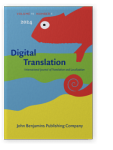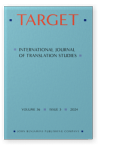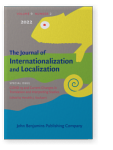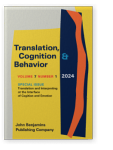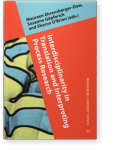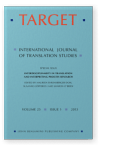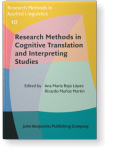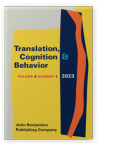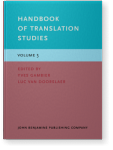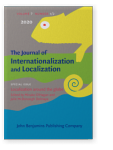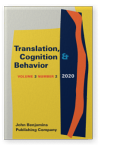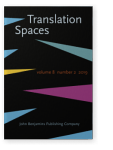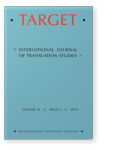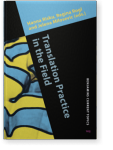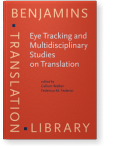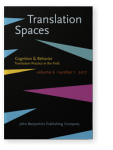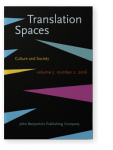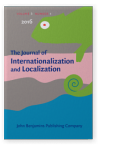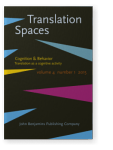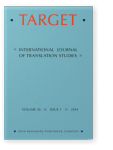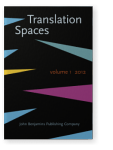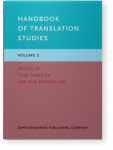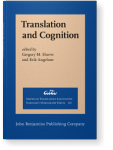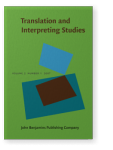Sharon O'Brien
List of John Benjamins publications for which Sharon O'Brien plays a role.
Journals
ISSN 2032-6904 | E-ISSN 2032-6912
ISSN 2542-5277 | E-ISSN 2542-5285
Titles
Interdisciplinarity in Translation and Interpreting Process Research
Edited by Maureen Ehrensberger-Dow, Susanne Göpferich and Sharon O'Brien
[Benjamins Current Topics, 72] 2015. v, 159 pp.
Subjects Interpreting | Translation Studies
Interdisciplinarity in Translation and Interpreting Process Research
Edited by Maureen Ehrensberger-Dow, Susanne Göpferich and Sharon O'Brien
Special issue of Target 25:1 (2013) vii, 154 pp.
Subjects Translation Studies
2025 Chapter 2. Designing studies with naturalistic tasks Research Methods in Cognitive Translation and Interpreting Studies, Rojo López, Ana María and Ricardo Muñoz Martín (eds.), pp. 49–68 | Chapter
This chapter presents an overview of what constitutes a naturalistic task in cognitive translation and interpreting studies (CTIS), taking into account research settings, methodologies, data collection methods, and the participants involved. Naturalistic tasks are situated along a continuum that… read more
2023 The impact of traditional and interactive post-editing on Machine Translation User Experience, quality, and productivity Translation, Cognition & Behavior 6:1, pp. 60–86 | Article
This paper presents a user study with 15 professional translators in the English-Spanish combination. We present the concept of Machine Translation User Experience (MTUX) and compare the effects of traditional post-editing (TPE) and interactive post-editing (IPE) on MTUX, translation quality and… read more
2021 Post-editing Handbook of Translation Studies: Volume 5, Gambier, Yves and Luc van Doorslaer (eds.), pp. 177–183 | Article
2020 Neural machine translation and the evolution of the localisation sector: Implications for training Localization around the globe, O'Hagan, Minako and Julie McDonough Dolmaya (eds.), pp. 95–121 | Article
The localisation sector is highly technologized and evolves rapidly. Though significant consideration has been given to third-level training in localisation for Translation Studies students, the nature of the industry is such that this topic demands regular attention. Our objective was to survey… read more
2020 MT Literacy—A cognitive view Translation, Cognition & Behavior 3:2, pp. 145–164 | Article
MT literacy means knowing how MT works, how the technology can be useful in a particular context, and what the implications are of using it for various purposes. As MT usage grows, the necessity for MT literacy also grows. This knowledge forms part of the greater need for digital literacies. In… read more
2019 More than tweets: A critical reflection on developing and testing crisis machine translation technology Translation Spaces 8:2, pp. 300–333 | Article
The application of machine translation (MT) in crisis settings is of increasing interest to humanitarian practitioners. We collaborated with industry and non-profit partners: (1) to develop and test the utility of an MT system trained specifically on crisis-related content in an under-resourced… read more
2019 Lynne Bowker and Jairo Buitrago Ciro. Machine Translation and Global Research Target 31:3, pp. 505–510 | Review
2019 Investigating the cognitive ergonomic aspects of translation tools in a workplace setting Translation Practice in the Field: Current research on socio-cognitive processes, Risku, Hanna, Regina Rogl and Jelena Milosevic (eds.), pp. 79–103 | Article
This paper reports on an empirical study that investigates the translation processin the workplace from a cognitive ergonomic perspective. In particular, theinteraction between ten translators employed by a language service provider andthe tools they deploy are examined. To that end, we recorded… read more
2018 Chapter 3. Overcoming methodological challenges of eye tracking in the translation workplace Eye Tracking and Multidisciplinary Studies on Translation, Walker, Callum and Federico M. Federici (eds.), pp. 33–53 | Chapter
This chapter discusses the use of eye tracking in combination with other methods for collecting and analysing translation process data in the workplace. Building on O’Brien (2009) and Teixeira (2014), we account for recent advances in eye-tracking technology and cover expanded use cases in which we… read more
2017 Investigating the cognitive ergonomic aspects of translation tools in a workplace setting Translation Practice in the Field: Current research on socio-cognitive processes, Risku, Hanna, Regina Rogl and Jelena Milosevic (eds.), pp. 79–103 | Article
This paper reports on an empirical study that investigates the translation process in the workplace from a cognitive ergonomic perspective. In particular, the interaction between ten translators employed by a language service provider and the tools they deploy are examined. To that end, we… read more
2016 Human factors in machine translation and post-editing among institutional translators Culture and Society, pp. 222–243 | Article
In September 2015, the ADAPT Centre for Digital Content Technology carried out a focus group study of 70 translators at the European Commission’s Directorate-General for Translation (DGT). The aim was to better understand the factors involved in the translators’ adoption and non-adoption of machine… read more
2016 Content profiling and translation scenarios The Journal of Internationalization and Localization 3:1, pp. 18–37 | Article
Today’s companies are overwhelmed with the need to create a huge amount of content, faster, customized, and for numerous media platforms, in order to support their products. Struggling with managing this amount of information, companies have now realised that the strategic management of… read more
2015 Ergonomics of the Translation Workplace: Potential for Cognitive Friction Translation as a cognitive activity, Alves, Fabio, Amparo Hurtado Albir and Isabel Lacruz (eds.), pp. 98–118 | Article
2015 The borrowers: Researching the cognitive aspects of translation Interdisciplinarity in Translation and Interpreting Process Research, Ehrensberger-Dow, Maureen, Susanne Göpferich and Sharon O'Brien (eds.), pp. 5–17 | Article
This chapter considers the interdisciplinary interaction of research on the cognitive aspects of translation. Examples of influence from linguistics, psychology, neuroscience, cognitive science, reading and writing research and language technology are given, with examples from specific… read more
2014 Depraetere, Ilse, ed. 2011. Perspectives on Translation Quality Target 26:1, pp. 147–150 | Review
2013 Introduction Interdisciplinarity in Translation and Interpreting Process Research, Ehrensberger-Dow, Maureen, Susanne Göpferich and Sharon O'Brien (eds.), pp. 3–4 | Introduction
2013 The borrowers: Researching the cognitive aspects of translation Interdisciplinarity in Translation and Interpreting Process Research, Ehrensberger-Dow, Maureen, Susanne Göpferich and Sharon O'Brien (eds.), pp. 5–17 | Article
The paper considers the interdisciplinary interaction of research on the cognitive aspects of translation. Examples of influence from linguistics, psychology, neuroscience, cognitive science, reading and writing research and language technology are given, with examples from specific sub-disciplines… read more
2012 Translation as human–computer interaction Translation Spaces 1, pp. 101–122 | Article
This paper seeks to characterise translation as a form of human–computer interaction. The evolution of translator–computer interaction is explored, and the challenges and benefits are enunciated. The concept of cognitive ergonomics is drawn on to argue for a more caring and inclusive approach… read more
2011 Collaborative translation Handbook of Translation Studies: Volume 2, Gambier, Yves and Luc van Doorslaer (eds.), pp. 17–20 | Article
2010 Controlled language and readability Translation and Cognition, Shreve, Gregory M. and Erik Angelone (eds.), pp. 143–165 | Article
Using eye tracking methodology, we investigate correlations between traditional readability indicators and controlled language (CL) rules applied to texts from the information technology domain. We evaluate the perceived readability and recall levels of the texts as well as the readability and… read more
2007 An empirical investigation of temporal and technical post-editing effort Translation and Interpreting Studies 2:1, pp. 83–136 | Article
This article reports on a study designed to quantify temporal and technical post-editing effort in machine translated texts. The study involved two groups of English>German translators, one instructed to post-edit a machine-translated text and the other to translate the same text from English into… read more
